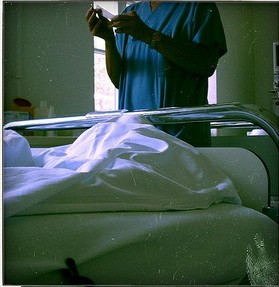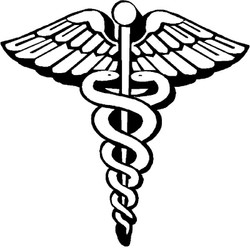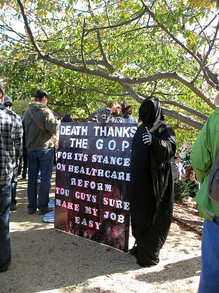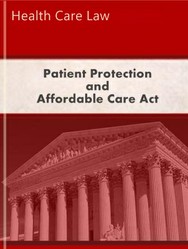
US Healthcare Through the Eyes of a Briton
by JoHarrington
Health care insurance or Medicaid dictates the level of medical treatment available to Americans. In Britain, everything is free.
The views on this page are highly subjective. I am writing about another culture of which, it can be argued, I know only what can be observed.
It is a request. Two American women, both friends, have approached me to ask that I share my perspective on the debates raging in the USA.
How would someone, raised within the comfort zone of universal healthcare, contemplate a nation that accesses medical services through its purse?
The short answer is 'with incredulity'.
My Introduction to the American Health System
Faced with a highly infected wound, my first and last instinct was to send the woman to hospital.
 In 2004, I visited America for the first time as an adult. It was a wonderful, mind-blowing experience, which still fills my daydreams today.
In 2004, I visited America for the first time as an adult. It was a wonderful, mind-blowing experience, which still fills my daydreams today.
I stayed with friends in Las Vegas, taking trips out into the desert, gaping at the magnificent Hoover Dam and staring wide-eyed at the lights on the Strip.
I flew over the Grand Canyon then. I had to remember to breathe, my brain too taken up with trying to assimilate what my eyes could see.
Yet for all that, the greatest aspect of the whole week was hanging out with people I'd known on-line for years. Those are moments that I'll treasure forever, precious beyond value. It also brought me in contact, for the first time, with the darker side of the US healthcare system.
I am a trained First Aider. Everyone there knew that, including the friend who turned up with a companion. This woman looked awful. Her color was on the greenish side of ashen grey. She walked stiffly, unwilling to move her head. When that was unavoidable, she winced, then froze with pain.
About ten seconds after saying hello, I was being asked to help her. The problem was obvious. Her left ear was swollen and infected. The redness had spread halfway down to her jaw. Around her lobe, there were parts which were turning black.
As a First Aider, I knew precisely what to do next. "She needs to go to ER straight away. Only antibiotics will deal with this, but the infection looks deep to me. She needs to get that checked out."
There was complete silence. It confused me. Back home, this would be the cue for someone to offer transport to the nearest hospital. She had just arrived in a car, so I didn't see any problem there.
In a voice laced with agony, she haltingly informed me, "I lost my job a fortnight ago, so I haven't got health insurance. This started soon afterwards, so I can't think straight to get a job."
I couldn't imagine any employer taking on someone with their ear looking like that. In bewilderment, I scanned the faces of the half a dozen Americans present. They were all looking sympathetic, cringing at her predicament, but there was nothing that any of them could do.
It was explained to me that taking her to the hospital would incur crippling costs. She would have to pay to see a doctor, then for any treatment that (s)he performed. In addition, there would be a bill for the prescription and medicine. The final tally could be in the thousands of dollars.
My head span with the implications. Had we all been in Britain, she might have had to wait for an hour or two in ER, but everything would have been free.
"What happens if you just turn up and tell them you can't pay?"
"You have to hand over your credit card details before you enter triage." One friend informed me. "That way you're liable for the debt, even if you do a runner after treatment."
I tried to fit this into my world view. "But the doctor will have taken the Hippocratic Oath! How could they possibly refuse to help someone who can't pay?"
Seeing that the mood was being well and truly shattered here, one friend placed her arms around me in a big hug. She cheerfully replied, "Welcome to America!"
The woman with the infected ear was eventually treated, but not by a qualified medical practitioner. Already a member of the Pagan community, she was cared for by a Wiccan with knowledge of herblore.
Should my US friend have been denied hospital treatment for her infected ear?
Please bear in mind, when answering, that she had no health care insurance nor other means to pay at that moment in time.
No, because...
 gryph.johnston
on 07/28/2012
gryph.johnston
on 07/28/2012
She had just gotten laid off, she couldn't get another job with being sick that way and if a bill goes long enough, the person ends up paying anyway because most states I know will take it out of your state taxes.
 Meagan
on 02/07/2012
Meagan
on 02/07/2012
I am in complete and wholehearted agreement with Ember. It is incomprehensible to me that in a relatively wealthy, developed country someone could be denied essential treatment because they can’t afford it.
 JoHarrington
on 02/04/2012
JoHarrington
on 02/04/2012
She could have died from that, if the infection had spread into her brain. That's just cruelty surely. If it's the economy that's worrying, then as soon as she was better, she would be back in the job market and able to contribute.
 Ember
on 02/04/2012
Ember
on 02/04/2012
I feel that healthcare should be considered a basic human right, not a privilege. And on top of that no aspect of healthcare, healthcare system, or healthcare organizations has any intrinsic value and therefore cannot be accurately or equitably allocated by the free market.
Yes, because....
 Typical Neo-liberalist >.>
on 02/05/2012
Typical Neo-liberalist >.>
on 02/05/2012
If she got treatment then that means the burden of healthcare would be on those that work hard and don't depend on others to survive. I mean I know she was working and all, and it was just a tough circumstance, but there are so many others who would just live off the system sapping honest hard working Americans of their own income. It just wouldn't be fair.
 | Sicko (Special Edition) For many Americanslaughter isn't the best medicine - it's the only medicine.ProductInformationIn Sicko filmmaker Michael Moore returns with a hilariously scathingindictment of ... |
 | Sicko, the Sequel The title of author Cheryl Ray’s book, Sicko, the Sequel, is a playful takeoff on Michael Moore’s documentary, Sicko. But while Moore focused on the inadequacies of American ... Only $5.95 |
The British NHS versus the US Health Insurance Plan
It's difficult not to make comparisons, when confronted with two ideologically opposed medical systems.
 In 2006, I was back in the United States of America again. This time it was for a month and I traveled from east to west and back again.
In 2006, I was back in the United States of America again. This time it was for a month and I traveled from east to west and back again.
No mere paragraph here could adequately capture all that I saw and did. From Georgia, Colorado, Utah, Nevada, California and New York, the country left me breathless with wonder. I had much to thank the beautiful American people for, especially their kind hospitality.
There was a friend's home in Estes Park, Colorado. We sat as a group on the deck outside, sipping drinks and chatting. The horizon was framed by the awe-inspiring Rocky Mountains, shimmering with the golden spread of aspen trees. In the wilderness between, we saw a herd of deer. It was against this back-drop that the conversation turned to healthcare.
Brian and I were both products of our respective countries. As an American man, he threw up his hands in horror at the idea of too much tax. As a British woman, I fully appreciated the coverage of the National Health Service (NHS). However, we were both curious and honest enough to truly want to determine which system was best.
Each year, I paid thousands in tax and National Health Insurance (NI). My dues were taken out of my pay-packet, before it was even handed to me. It amounted to a third of my wages each month, some of which went towards the health service. Compared to Brian's tax payments, this was an astronomical sum to be claimed by the government. Strike one was well and truly in the American court.
We came up with two scenarios. In the first, one of us had just broken an arm. It patently needed medical treatment, because the limb would need securing in a cast. I could (and indeed have) walk into a British hospital, anywhere in the country. I would register my name and address, but only so that this visit could be attached to my own doctor's medical file. Then I would take my seat in the waiting room.
I would be called for triage, so that a nurse could assess the medical emergency. Eventually I would be sent for x-ray, then to have my arm placed in the appropriate cast. I might be given or recommended painkillers, before being sent home again. A few weeks later, I'd be back to have the cast removed. Job done. At no time would I be asked for, nor expected to contribute, payment.
Brian, on the other hand, would experience the same treatment, but with a hefty bill at the other end. He checked the approximate costs and my eyes boggled, but then he compared that to my annual tax and NI bill. In reality, I was paying much more than that broken arm warranted. Strike two was once again with the USA.
Then we visited our second scenario. One of us got cancer and needed long-term care. All of those doctor's appointments, consultations, chemotherapy, medicine and surgeries really did add up. My bill was still free, because it's covered by the deductions from my wages. Brian had to fund them all himself.
He owned his home and three businesses. He had other assets besides, which rendered his family more than comfortable. He also had up-to-date, comprehensive health insurance. At first, it seemed that he was going to win this one too, but the deeper we delved, the more we discovered that his plan wouldn't pay for half the medical care required.
Eventually, very grim-faced, he conceded that he would have to mortgage his house or sell one or more of his businesses. His family would cope for, perhaps, a year or two, but if the medical condition continued beyond that, they would be in trouble.
It took a long time of comparing data and small-print, but we reached our conclusion. When it comes to serious or prolonged healthcare provision, Britain wins out every time.
 | National Health Service: A Political History The foundation of the National Health Service on 5 July 1948 was a momentous development in the history of the United Kingdom. Webster's political history is an entirely new ... |
 | The Healing of America: A Global Quest for Better, Cheaper, and Fairer Health Care Important and powerful...a rich tour of health care around the world." -Nicholas Kristof, The New York Times How is it that all other industrialized democracies provide health ... |
A Disparity in Care Between Britain and the USA
Practically living on the internet, I have a wide cross-section of friends on both sides of the Atlantic. Some healthcare provisions can be compared like for like.
 Over in the American West, my friend was depressed and a little scared. She was considering dropping out of post-graduate education, where her research was breaking new, niche ground in biology. She needed to get a proper job and fast.
Over in the American West, my friend was depressed and a little scared. She was considering dropping out of post-graduate education, where her research was breaking new, niche ground in biology. She needed to get a proper job and fast.
Her decision made no sense on any level. It's a running joke amongst our circle of friends that she'll one day cure cancer. Her grades were high. Her professors loved her. So why give all of that up to get stuck in an office or flipping burgers?
She informed us that her father is a diabetic. He became ill before the diagnosis and lost his job. Once his healthcare insurance ran out, no other company would touch him, because of the pre-existing condition. He had mortgaged the family home to pay for his insulin, but now that money was running out too.
The bank were screaming about the missed mortgage repayments to them. He literally had a choice between insulin or home. That was why his daughter was desperate to find a job.
In Britain, one of my closest friends is diabetic. His insulin is provided free of charge by the state, along with all of his check-ups. He is rendered healthy enough to maintain a well paid job, through which he pays a third in tax and NI stamps.
I'd never heard of bipolar until a few years ago. Now I have three friends all diagnosed with it. Two of them are British. There were weeks and months respectively when I could have cried for both.
This was during the period that first one drug, then another was tested to find the perfect fit. They each had days of lethargy and drowsiness to the point where they slept constantly. They had others where depression brought floods of tears. Finally, the medicine was matched to the individual and everyone breathed a sigh of relief, not least the two people in question!
Their quality of life is now such that the bipolar barely factors. It is controlled. They are able to work, play and contribute to society again.
The third person is an American student. It took a crisis of absolute distress before her University's administration referred her to an aid psychologist. He diagnosed bipolar and gave her 23 days worth of a drug which made her sleepy. It didn't help alleviate any of the symptoms of her condition. Once it was over, there were no more freebies.
She has had to drop out of higher education and return to the care of her infirm mother. Both are too ill to secure health insurance for her; and an adviser ruled that she didn't qualify for Medicaid. For now, her bipolar remains unchecked, leaving her unable to adequately perform in society.
These are just two examples from a raft of them, which I have personally encountered amongst my social network. They all end the same, with the unfortunate American being left in desperate straits, while the Briton receives the healthcare and carries on.
 | Sick: The Untold Story of America's Health Care Crisis---and the People Who Pay the Price America's health care system is unraveling, with millions of hard-working people unable to pay for prescription drugs and regular checkups, let alone hospital visits. Jonathan ... |
 | Landmark: The Inside Story of America's New Health Care Law and What It Means for Us All ... The Washington Post’s must-read guide to the health care overhaul What now? Despite the rancorous, divisive, year-long debate in Washington, many Americans still don’t ... |
WHO Ranking of Global Healthcare Systems
France leads the world with the greatest medical provision. The UK came in at 18th, while the USA languishes at 37th.
When I was in high school, my Sociology teacher told us that you should always judge a community by how they treat their weakest members.
The old, the infirm, the sick and the vulnerable can only survive in a strong, thriving society.
I was reminded of that adage, when I saw that woman's infected ear back in 2004. It's floated to the top of my mind every time I've sat helpless, listening to how yet another American friend has been denied the medical care that they desperately needed.
I recall it again when I read some of the more horrific headlines of people left to die in US hospital waiting rooms.
I'm also thinking here of 24 year old Kyle Willis, who died in September 2011 because he couldn't afford to have his infected wisdom tooth extracted. That case mirrored another from 2007, when 12 year old Deamonte Driver's brain swelled and he died, because his mother didn't have the insurance to cover an $80 tooth extraction.
In fact, a Harvard Medical Study (PDF) linked the deaths of 45,000 Americans per year to the fact that they couldn't afford the treatment to save their lives.
As a Briton, with access to free and universal health coverage, it's difficult to know what to make of it all. The facts appears to point to a concerted effort, aided and abetted by the potential victims themselves, to simply cull the weak. The over-riding ethos seems to say, if you're too ill, old or damaged to make money for the economy, then just die.
As an historian, I have encountered attitudes like that before. It harks back to Victorian Britain, when the attitude was that the poor were simply lazy. No mitigating factors allowed. Those notions died in the devastation of two world wars.
Yet even on the eve of the National Health Service, doomsayers warned that the country would be bankrupt and no doctor would work for free. That doesn't seem to have happened at all. Over sixty years on, the NHS is still going strong and woe betide any politician who sought to dismantle it now!
The American Health Insurance Plan appears as a laughably inefficient medical system to me. According to the World Health Organization, the USA pays more money per person per capita for healthcare, but its current structure is ranked 37th in the world. Where precisely is that money going, when thirty-six other countries pay less and provide a better service?
I have personally paid more money into the NHS than I have ever taken out again in care. I view that as luck so far, but also a dividend that I'm likely to take advantage of in the future. After all, I will grow old, unless something terrible intervenes, and with age comes fragility. I am simply glad of the security that being a Briton, with universal healthcare, affords me. I wouldn't swap it for the perceived cruelty of the American system for the world.
Poll: Do you prefer the British or US system of healthcare?
More Articles Covering US Law and Politics
You might also like
Health Reform Is Law; How Will It Affect Your TaxesThere's lots to know about Obamacare when it comes to your taxes. Here are so...
The Health Care Bill (ObamaCare)For a nation that prides itself on being first... America has become number o...










 St Tydecho's Churches in West Waleson 09/03/2014
St Tydecho's Churches in West Waleson 09/03/2014
 Goodies for an Outlander Premiere Partyon 03/06/2015
Goodies for an Outlander Premiere Partyon 03/06/2015
 Holocaust Memorial Day Interview with Rainer Höss, Grandson of Rudolf Architect of Auschwitzon 01/24/2015
Holocaust Memorial Day Interview with Rainer Höss, Grandson of Rudolf Architect of Auschwitzon 01/24/2015
 Romantic Valentine Gifts for an Outlander Fanon 01/16/2015
Romantic Valentine Gifts for an Outlander Fanon 01/16/2015



Have your say!
The fact that healthcare has a price tag is quite horrific. The archeological evidence says that Homo Erectus cared for their sick and dying. They lived in a much more hostile world than we do. It's quite scary to realize that we've evolved into a species that cares less, the further that we go.
As a Pagan, I know a great many people who turn to witches to treat their ailments. When healthcare is priced out of the reach of those in need, then people return to basics.
Thank you very much for your views on this subject. As always, you were very erudite and eloquent in them.
Humagaia - In nearly 40 years of being born and bred a Briton, I've never heard anyone begrudge the National Health Insurance stamps. Yes, we might whine about taxes in general, but not that. I think the British comments on this article so far are uniformly repeating that ethos. Thank you for adding your view too.
I agree that it seems a strange message for the US to send out to the world. This is why people always laugh, when we hear that rhetoric about 'land of the free' and 'democracy', while stuff like this is making international headlines.
ShersAndroid - As with brl, your take on the matter is doubly important. You have experience of both sides of the issue, which is why I'm scrutinising your comments. You've confirmed all that I was thinking. Thank you.
You wrote a great article that hit me. I'm an American expat, married to a Czech, and live in the Czech Republic. People here are abashed when they learn about the healthcare situation in the US. They are also surprised to learn that most Americans do not want universal healthcare. They can't comprehend how a country of such wealth can do this to their own people.
I have to agree with brl. Living "across the pond" for several years, now, I've become adjusted to the healthcare in this country. My husband and I don't worry that we will lose everything we have if one of us becomes seriously ill, and we can see the doctor when necessary. For the most part, healthcare is as good here as it is back home. The Czech Republic has one of the best records, in the world, for the numbers of premature babies that survive each year. I've been treated very well by all medical staff here, even though I'm a foreigner.
I had to live without health insurance at one point in my life, and I ended up with a major surgery that I had to pay for. Fortunately I had the means to do that, but it took all my savings. Everyone should be entitled to health care and not have to lose their homes or die early because they can't afford a simple medical procedure that would save their lives.
"...........treatment then that means the burden of healthcare would be on those that work hard and don't depend on others to survive" just shows the uncaring, I'm all right Jo, attitude of the naysayers. I'm a Brit, proud to be in a society that took the idea of universal health care through to implementation. I worked hard, long hours, away from my family, for 30 years, paying around 50% of my income in taxes and NI - I had a good job! I did not mind (well a little bit) as I had peace of mind knowing that I, and ALL my family, would be aided should we require it. I paid insurance for medical assistance - National Insurance. Everyone that can afford it pays medical insurance in the UK - National Insurance. Insurance is that, to insure against the possibility of need. There is no small print. It does not run out when you most need it, or when it is deemed that you have used it up. That is the British way.
Americans that can afford to pay for private medical insurance do so with the knowledge that, should they need it, it may not be enough to cover their needs. The system is geared towards the rich. They, and only they, can live without fear or doubt that they will be catered for in their hour (or year, or decade) of need. Those that are below the 'rich' status should wake up, smell the air, and understand that this situation is tantamount to oppression. The US fights against oppression overseas. It is a part of their constitution to fight against religious persecution. Why cannot they see that their medical insurance system flies in the face of basic human rights; is medical oppression; and does not actually do what it says on the tin.
What message does it send out to the world? But then again, do they care?
Thank you, brl, your perspective is uniquely valuable, as you have insight on both sides of the debate. I was very conscious while writing this that I've only really been exposed to the American horror stories, while sitting pretty with my British universal healthcare.
What you said about bankruptcy as an option struck a chord. An American friend was only telling me a couple of days ago that her mother is considering that option, just to pay for essential medication to keep a family member alive.
Wow Meagan, you've just hit the nail on the head! The quality of life versus money in the pocket thing is precisely what I've been struggling to articulate. I keep ending up in conversations about this issue and I'm going to use that to explain what I mean from now on. Thank you!
Excellent article - thanks for sharing these stories! In Australia our public health system is not as comprehensive as the NHS but no one would be denied necessary treatment. Although I rarely use the public health system I’m happy to pay tax to live in a society in which basic healthcare is a right for all. This means more to my quality of life than a few extra dollars in my pocket.
Ember - I'd not considered anything to do with healthcare in terms of the free market economy. That is an awkward fit, I agree. You explain all of this so well!
In Britain, healthcare is seen in the same category as education. They are both free, basic provisions. As long as the population is educated and healthy, then the country can thrive.
So some people can't get healthcare insurance at all in the USA, based on their age, demographics etc? What actually happens if that major illness does strike them? Or is this where the 45,000 dead Americans without insurance kicks in?
Ah! I understand about the cheaper option for employers now. Thanks for clearing that up. Thanks too for clarifying about the VA.
Despite that we do let healthcare be a free market good. It is a system doomed to fail (it is failing, miserably) and so with insurance companies in the current set up they know their risk of net losses is essentially guaranteed. So, it leads to them being incredibly corrupt in order to actually make a profit. They take you age, weight, height, and based on your demographics, deny you coverage for the major illnesses you are most likely to get. They don't look at insurees as people, their demographics are numbers in a larger algorithm, which spits out a risk, and if its too high, the company won't take it on. Just like any other free market company might do. The problem is, they are people.
Companies buy insurance en masse for all of their employees. No one gets denied coverage, except on the basis of preexisting conditions. Other than that, I am not sure how the cost is worked out. Other than perhaps the employee paying a significant portion if they signed on for it, and the company covering the rest. I'll have to ask to learn how that all works.
Yes, the VA, or DVA is the Department of Veteran Affairs and they have their own healthcare system. My brother is ex-military, and they even pay his 'travel expenses' because there is no VA hospital in his home town, so he has to drive out of town to get his healthcare. He technically has no need for health insurance, unless he doesn't want to go to the VA. He prefers to go to a regular doctor in our hometown though, but should he ever need it, the VA hospital is there for him.
Sorry for the super long response.
To be fair, I do have a biased perspective. I am totally against my system and my views are what one might label progressive, so what I present are facts, but from that perspective. :)
You're not offensive, I hate our system. As far as racketeering/protectionism, I'm not sure the government does anything in general in that sense to insurance agencies. In my opinion they are quite corrupt, however I feel that corruption is a natural product of the system. Healthcare, as a good or service, has no intrinsic value. So, if I were to offer you bone marrow transplants, chemotherapy, and the cost of hospital stay--something that technically values at a several hundred thousand dollars-- free (assuming you were American and couldn't already get it free!) would you take it? But I'm offering it now, you have to take it now.
Obviously you'd say no, you have no need for chemotherapy, and a bone marrow transplant in and of it self is quite a risky procedure, you could easily die in the days after the transplant. If you aren't suffering from a blood-related cancer, why the hell would you undergo something like that? In fact, without being ill, I doubt I could even pay you to undergo that treatment.
I could turn around and ask another one hundred individuals the same question, and statistically, about 99 of them would also say no.
In that sense healthcare is worthless. It may technically cost a few hundred thousand dollars to perform the procedure, but there isn't a proper market competition for it. It has no intrinsic value. Beyond that, I said I couldn't even pay you to undergo a bone marrow transplant. Healthcare, according to the free market, statistically actually comes out with a negative value.
This goes for any procedure you could care to name, with the statistics of someone out there who would say yes varying accordingly. Free tooth extraction today then? The risk is lower, maybe I could actually pay you to let me take you teeth this time.
So this is just outlining one problem-of several- that make it really hard to allocate healthcare in a free market. The nature of it, as a good or service, just does not allow for it. Rather it should be allocated much how a public park or school system is allocated.